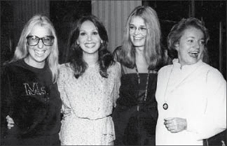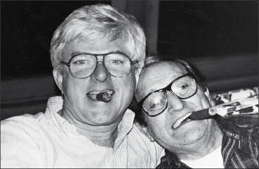Growing Up Laughing: My Story and the Story of Funny (25 page)
Read Growing Up Laughing: My Story and the Story of Funny Online
Authors: Marlo Thomas
At a backyard fund-raiser with “Tanta Bella” and Carol Burnett.
I called her “Tanta Bella.” She was the loving, demanding aunt, always advising Gloria and me about everything, including marriage. She was happily married to Martin Abzug, the most supportive man in the world, and they had two great daughters. She saw no reason why Gloria and I couldn’t do the same.
She was crazy about Phil, and taunted me about marrying him. “What’s wrong with you?” she said. “You think you’re going to do better than this?” Bella was something else.
Shortly after I was married, I was on a flight to Chicago. I’d just been seated, when Bella bounded onto a plane (everything she did was big), and when she saw me, she bellowed in her loudest voice, “When are you going to have a baby?!” Everybody looked at us. I was mortified. So I bellowed back, “I got married. Make Gloria have the baby.” One of the few times I got in the last word with Bella.
Phil and I were married quietly at my parents’ house in May of 1980, with just our families present. The night before, I wrote Gloria a letter. I was worried that when she heard the news, she would feel abandoned, as I had felt when all my friends got married many years before. We had both been single for such a long time, and we’d reveled in it. A lot of young girls had written me, saying that when their mothers nagged them about settling down, they’d use me as an example.

A happy coalition (from left), Letty Cottin Pogrebin, Gloria and Pat Carbine, all of us cofounders of the Ms. Foundation.

With matching cigars: the men in my life.
“Marlo Thomas isn’t married, and
she’s
not crazy.”
I think Gloria and I felt we always had each other to point to, as well. It was a bond between us. And now I was breaking it. But she was happy for me, and when Phil and I returned from our honeymoon, she and Bella threw me a bridal shower. They made little posters with every disparaging comment I’d ever made about marriage and hung them around the room. What a shock it was to see them all together like that. No wonder I never wanted to marry.
But I don’t think anyone was more surprised that I was getting married than my mother. She kept asking Phil at our wedding, “How did you get her to do this?” Dad was simply happy that I had found this lovely man and that I was finally settling down. He celebrated in the Lebanese tradition by taking his handy old shotgun outside and firing it three times into the sky. Of course, the neighbors called the police, but it was good to know that the years had not lessened “Orson’s” sense of the dramatic.
WHEN PHIL AND I
were on the plane to Greece for our honeymoon, he left his seat to go to the bathroom. The woman sitting across from us noticed my wedding band.
“You’re Marlo Thomas, aren’t you?” she said. “Did you get married?”
This was the first person outside of our families to know about our wedding. I blushed, in my new bride role.
“Yes,” I said shyly. “We were married yesterday.”
“Why?” she said. “I am
so
disappointed. Why would you get married?”
I was stunned.
Oh my God,
I thought,
what have I done? Women like this have been looking to me to set an example of independence. And now I’ve let them all down
.
But then Phil returned to his seat. And I got over it.
M
y mother was right. The joke was on me. Me, who had carefully built a life around being on my own.
Miss Independence
.
When I was doing my TV series, I had used my first money to buy myself a beautiful, big house on Angelo Drive in the hills above the Beverly Hills Hotel and, without the use of a wedding registry, had picked matching china, crystal and a silver pattern. Take that, traitorous girlfriends!
And now here I was in Winnetka, a suburb of Chicago, moving in with a man who was raising four boys, ages 12 to 16—Michael, Kevin, Danny and Jimmy. His daughter, Mary Rose, lived with her mom in New Mexico. It would have been nice to have had one more female under our roof. I’d never seen so many jockstraps in my life. Or wet towels. It was like living in a frat house.
But they were sweet, and they had done
some
organizing. They had all put their names on their underwear. It was the first time, however, that I had been with a man who had “Dad” written on his jockeys.
But I adjusted fast. I took to hiding bottles of Coca-Cola under the bed. With four boys and assorted pals, it was them or me.
I went into Jimmy’s room, where his socks stood up by themselves, and there were discarded pizza boxes under his bed. I told Phil about it.
“Try not to think about it,” he said.
It was all I thought about. I’d fall asleep with images of maggots dancing in my head. I had been raised by a drill sergeant kind of mother. “A place for everything and everything in its place” was her mantra. Maybe some place underneath all this mess I’d find
my
mantra.
Terrified of being any part of the fantasies of teenage boys, I found the mornings especially challenging. I never left the bedroom in a robe or any kind of casual wear. I was always completely dressed, hair in place, as if their father and I had been having an all-night meeting in that room down the hall.
And I was working hard to keep my feminist values up front, teaching Phil the smallest of things. Like what a hamper was for. What really got to me, though, was that all of them kept asking me where their things were.
“Where are my shoes?” Phil would constantly ask.
What is it about men? They think we women have a radar attached to our uterus. And the thing that killed me was that I knew where they were. I knew where Phil’s shoes were. I knew where
all
four boys’ shoes were.
How did this happen? Had my mother secretly planted a chip in me at birth that would activate when I said “I do”? I was beginning to understand why there hadn’t been a female Shakespeare or Mozart. There wasn’t room in their heads for symphonies and sonnets—their brains were cluttered with where everyone’s shoes were.
And through it all, I kept thinking,
Now my mother is completely happy.
Terre and Tony had been settled for some time, but that hadn’t stopped her one bit from continuously nagging me to join the betrothed battalion. And when her rhapsodizing about the glory of it all hadn’t made a dent in my resolve, she brought out the big guns: “You’ll die alone!” Nice.
So when Mother called me in Chicago, where Phil and I were living the first summer after our May wedding, I regaled her with my marital adventure. I was
Marloizing
Phil’s house with new closets. I’d gotten the boys to come out of their rooms
at the same time
for the family dinner hour. I’d color-coded the towels.
And brimming with newfound maternal pride, I told my mother that Phil was bragging to everyone about how I could talk to his sons individually.
“She got the book on each of them very quickly,” he’d say. “Most people speak to them as a flock.”
As I went on and on to my mother, knowing how thrilled she’d be by all of this, she interrupted.
“What about your career?” she crisply asked.
Yep, it stopped me, too. This woman had hounded me to get married for most of my life, but here it was: Underneath it all, she had been as conflicted about it as I was.
I had always made the joke that I was “my mother’s revenge.” But like all good jokes, it was rooted in truth.
ROUGHHOUSING with RITA . . .
“I love being married. It’s so great to find that one special
person you want to annoy for the rest of your life.”
—Rita Rudner
“I think men who have a pierced ear are better prepared for
marriage. They’ve experienced pain and bought jewelry.”
—Rita Rudner
“I want to have children, but my friends scare me.
One of my friends told me she was in labor for 36 hours.
I don’t even want to do anything that feels good for 36 hours.”
—Rita Rudner
“It wasn’t that no one asked me to the prom,
it was that no one would tell me where it was.”
—Rita Rudner
“Marriages don’t last. When I meet a guy, the first
question I ask myself is: Is this the man I want my
children to spend their weekends with?”
—Rita Rudner
“When I eventually met Mr. Right,
I had no idea that his first name was Always.”
—Rita Rudner
. . . and ROSEANNE
“As a housewife, I feel that if the kids
are still alive when my husband gets home
from work, then hey, I’ve done my job.”
—Roseanne Barr
“Experts say you should never hit your
children in anger. When is a good time?
When you’re feeling festive?”
—Roseanne Barr
“The quickest way to a man’s heart
is through his chest.”
—Roseanne Barr
“Women complain about PMS,
but I think of it as the only time of the
month when I can be myself.”
—Roseanne Barr
“My husband said he needed more space.
So I locked him outside.”
—Roseanne Barr
Like the rest of America in the fall of 2008, I couldn’t wait for the weekend to watch Tina Fey’s dead-on send-up of Alaska governor Sarah Palin, on
Saturday Night Live.
Tina’s channeling of Palin was by far the best female impression I’d ever seen, and almost overnight, her winks and “You betcha’s” turned her from a star into a superstar. But nothing about Tina’s remarkable rise qualifies as “overnight.” She worked her way to the top from the scrappy improv circuit in Chicago (including Second City), where she honed her performing and writing skills. For all the comedy writers that roamed through our house—and our lives—when I was growing up, there never was a woman at the table. Tina not only made it to the table of
SNL
writers—in just a few years she moved to the head of it. But to her it’s not about gender, it’s just about getting the laugh. That’s something she’s been doing her whole life.
—M.T.
Step One: Come from a Funny Family
Tina:
I grew up in Upper Derby, Pennsylvania, outside Philadelphia, and I think there’s something about the Northeast—New York, Philly, Boston—where everyone’s a little bit of a smart aleck. I went to college in the South, and my roommates would always say, “How come when your family’s here, if you ask them a question, they’ll always give you a sarcastic answer?” I’d say, “I guess that’s just how we do it up there. Everybody’s kind of a wisenheimer.”
Step Two: Have Greek Uncles
I had an Uncle Pierre and an Uncle Napoleon—I don’t know why they were named that; we’re a Greek family—and they were very funny, in a cutting kind of way. They were great at take-down humor. Like, when Uncle Pete would come over, he’d play my mom in Scrabble, and when he’d start winning, he’d turn to me and say, “Go comfort your mother. She’s crying.”
Step Three: Find Your Comic Groove
When I was 12 or 13, I decided that I wanted to try to be funny. That’s the age that you realize,
Oh, I get it—some girls are going to be very pretty, and then the rest of us have to figure out what our coping mechanism is going to be
. Looking back, having greasy skin and getting your boobs at ten is actually a good way to grow up. It builds character.
Step Four: Do Your Research
My brother always made me laugh. He’d imitate everything he saw on
Saturday Night Live
—he did a great Steve Martin. But we were all big fans of comedy shows. We watched everything on TV. Old Burns and Allen, classic sitcoms, Marx Brothers movies, Laurel and Hardy, and all of the Monty Pythons. We practically lived on Channel 48.
Step Five: Try Out Your Material
I wasn’t exactly the class clown, but I was definitely funny—I just wasn’t up front about it. I’d mutter things under my breath so my friends could hear it, and they’d always laugh. Basically I think I became funny to get people to like me. I especially remember being a cut-up in algebra class. That’s because I wasn’t great at math, and getting a laugh was a lot easier. My favorite joke was: “Two peanuts were walking down the street, and one was a-salted.” Okay, it’s a really, really dumb joke, but it always made me laugh.

Step Six: Make One Last-ditch Effort Not to Be a Comedian
In college, I thought about becoming a serious actress, but it quickly became clear to me that that wasn’t the right path. My problem with learning how to act was that I was never sure what you were supposed to be thinking about when you were doing a role on stage—unlike with improvisation, where your focus is always on your scene partner. So eventually I began to write, and wound up studying playwriting. And most of my plays came out funny, as opposed to serious.
Step Seven: Take It to the Next Level
In the early Nineties, I moved to Chicago and started studying at Second City. I had a day job, working the front desk at the [Evanston] YMCA, which left my nights free for classes. I’d take the train to work every morning at 4:00
A.M.
, always with the same group of Polish cleaning ladies. I somehow convinced myself they were looking out for me.
For a brief period, I tried stand-up—at a very, very amateur level. I enjoyed it and really respect it as an art form. But to go out there alone is really tough. The highs are high, but the lows are
really
low.
Step Eight: Be Discovered
I began working on
Saturday Night Live
in 1997. I was a writer there for a few years before I moved to on-camera. It took some adjusting moving from performing full-time to writing full-time. It’s tough giving away your best material to someone else—though when they’re a better performer than you, that makes it a lot easier. When the job opening came up to co-anchor the “Weekend Update” news segment, [producer] Lorne Michaels asked me to do a screen test. I wasn’t that nervous because I’d been working there for three years. I knew the room and the people I was auditioning for, and I knew I had a job to fall back on. I was lucky in that way because, if I’d come in out of the cold, I would have been really, really intimidated. To audition in that room is scary. There’s, like, two people watching you and nobody laughs. It’s the worst.
Step Nine: Become a (Gasp!) Sex Symbol
I was extremely amused when people in the media started calling me “a thinking man’s sex symbol.” Obviously, it was because of my glasses, but glasses make anyone look smarter. Put a pair on a
Playboy
model and she becomes a paleontologist.
But the most hilarious thing for me was when
People
magazine named me one of the 50 Most Beautiful People of the year. Every year, there’s always a person on the list who makes you roll your eyes and say, “Yeah, right.” I guess I was that year’s person. Still, I’m not going to complain about it. I’ve decided to stash all those magazines in a trunk, and then show them to my daughter one day.
Step Ten: Learn to Do a Dead-on Impersonation of a News-Making Vice Presidential Candidate
People were fascinated with Sarah Palin, regardless of whether they loved her or not. The weirdest thing for me was when everyone kept commenting on how similar we looked. Hello? This woman has perfect teeth and a great tan—and she’s got really long legs. I will admit, however, that we have similar noses.
THE BOOK OF PAUL
One of the quickest minds ever to light up a television game show was comedian Paul Lynde on
Hollywood Squares,
hosted by Peter Marshall. Let’s go to the tape . . . —M.T.
Peter:
Paul, what is a good reason for pounding meat?
Paul:
Loneliness.
Peter:
Do female frogs croak?
Paul:
If you hold their little heads underwater long enough.
Peter:
If you were pregnant for two years, what would you give birth to?
Paul:
Whatever it is, it would never be afraid of the dark.
Peter:
According to Ann Landers, what are two things you should never do in bed?
Paul:
Point and laugh.
Peter:
Paul, how many men are on a hockey team?
Paul:
Oh, about half.
Peter:
What did the Lone Ranger always leave behind when he left town?
Paul:
A masked baby.
Peter:
Why do Hell’s Angels wear leather?
Paul:
Because chiffon wrinkles.
Peter:
Paul, in ancient Rome, bakers were required by law to bake something into each loaf of bread. What was it?
Paul:
A Christian.